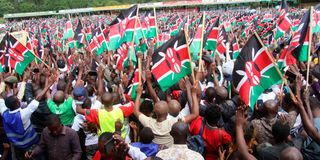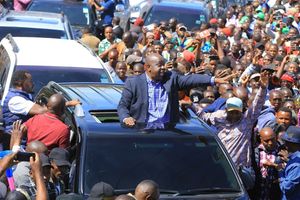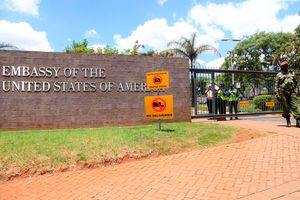
Youth pray facing Mt Kenya at Kabiruini Show Ground in Nyeri town on December 31, 2024.
In the 21st century, democracy in Mount Kenya, one of Kenya’s most populous and wealthy regions, is on a free-fall. The region is at the crossroads, faces the same leadership crisis as ancient Greece some 2,424 years ago.
Citizens in the Greek City of Athens, reputably the cradle of democracy, were virulently proud of their democracy. But one of Athens’ finest minds, Socrates, warned fellow citizens that when thieves, fraudsters, cranks, crooks and charlatans are democratically elected to power democracy then becomes a dangerous death-trap. Much to the chagrin of his fellow Athenians, Socrates predicted democracy’s final fall, dismissing it as the worst form of rule, inferior to every other political arrangement, except tyranny.
The philosopher was wary that then, as now, democracy carried the seeds of its own self-destruction. Because it is tailored to please everyone, democracy is its own gravedigger. “The poor will want the wealth of the rich, and democracy will give it to them”, he lamented. “Young people will want to be respected as elderly, and democracy will give it to them. Women will want to be like men, and democracy will give it to them.
Foreigners will want the rights of the natives and democracy will give it to them. Thieves and fraudsters will want important government functions, and democracy will give it to them,” he added. Democracy’s final fall comes when “thieves and fraudsters finally, and democratically take authority,” giving rise to a dictatorship worse than any monarchy or oligarchy. When in the hands of populists and demagogues, democracy is as dangerous as a ship under a crew with no knowledge of sailing. It will, certainly, sink.
The people of Mount Kenya—the Kikuyu, Embu, Meru, Mbere, Chuka, Mwimbi and Tharaka—once isolated repressed in ‘Britain Gulag’ as the “Mau Mau tribes” have a rendezvous with democracy on August 10, 2027.As a result, the region—comprising Meru, Tharaka Nithi, Embu, Kirinyaga, Nyeri, Laikipia, Nyandarua, Murang’a, Kiambu and Nakuru counties, together with a sprawling diaspora across the country —has become a hubbub of intense political mobilisation, creation of new parties, refurbishing of old ones and alliance formation.
Mount Kenya
Three years after the epic August 9, 2022 elections, the Mount Kenya has become an absurd tale of “when the winner becomes the loser,” and “the hunter becomes the hunted.” The region gave President William Ruto over 47 percent of the vote that catapulted him to power. Section of the region’s leadership and business marabouts picked up the tab for the former Prime Minister Raila Odinga’s presidential bid, and the region gave nearly 20 per cent of the votes that made him Opposition chief.
Today, a strange reversal of fortunes and deep sense of betrayal unite supporters of Ruto and Raila now in a political cold. Ruto waged a brutal ‘lawfare’—the underhand use of legal proceedings to defeat an opponent—against the region’s scion, Geoffrey Rigathi Gachagua, effectively removing him from the Deputy Presidential perch through impeachment.
In what seemed like a civilian power heist, Ruto share power with Odinga in a broad-based government, isolating and forcing the region to become Kenya’s de facto opposition. Democracy is truly an ass. Voters in the region have to live with the fact that they cast about 64 per cent of the votes that underpin the Raila-Ruto mongrel Government! They are under pressure to win the hearts and minds of other Kenyans to overcome a refurbished 41-against-one ethnic gambit to isolate them ahead of 2027.
One-day-democracy
The million-dollar question is how President Ruto out-maneuvered the Mount Kenya elite. The answer is clear. The region’s voters are victims of Kenya’s ‘one-day-democracy’ where citizens only exercise their power during the voting day. Citizens badly need as robust every-day-democracy that allows them to hold leaders accountable and to participate in public decision-making at every stage.
The internationally acclaimed writer Chinua Achebe, concluded that: “The trouble with Nigeria is simply and squarely a failure of leadership.” The same rings true of the serious leadership deficit in Kenya and its mountain region—perhaps the only region where voters have no qualms electing illiterates to office.
Decades ago, the region grasped the logic of a functioning democracy and gave Kenya its best and ablest sons and daughters as leaders. Not surprisingly, the region bequeathed the country three of its five presidents, excellent statesmen, ministers, legislators, civil servants and business moguls who have helped shape the destiny Kenya over the last six decades.
During the dark days of one party rule, many principled leaders were assassinated or purged. Since 1992, when the multiparty crusader, Kenneth Matiba made the “let the people decide” clarion call, the routinely voted in jokers, cranks, crooks and charlatans with the gift of the garb. Ahead of the 2013 elections, political scientist, Mutahi Ngunyi, gave a pride of place to the crude “Tyranny of Numbers” over the critical “tyranny of brains.” “Our tyranny of brains will deal with their tyranny of numbers,” the legislator, Millie Odhiambo retorted.
Only by uniting and investing in enlightened leadership can the region leverage its huge potential. In 2027 and beyond, Mount Kenya, like the rest of Kenya, must elect its best and ablest to public offices to prevent democracy from becoming a death-trap
Professor Peter Kagwanja is the Founding President and Chief Executive of Africa Policy Institute. [email protected]










